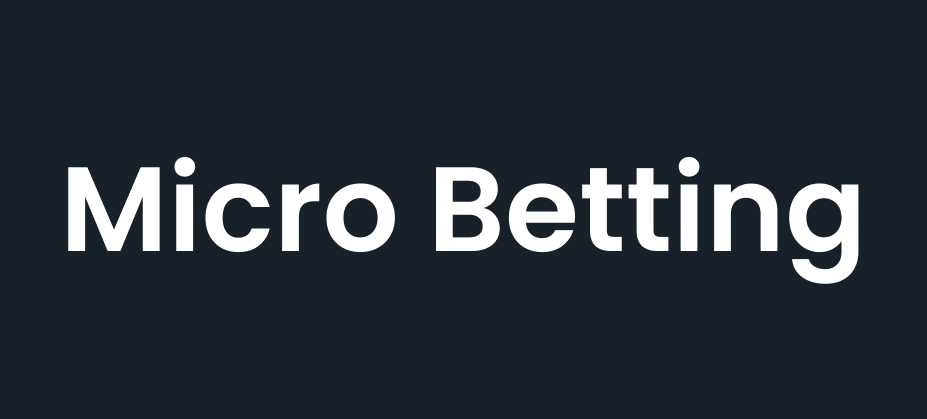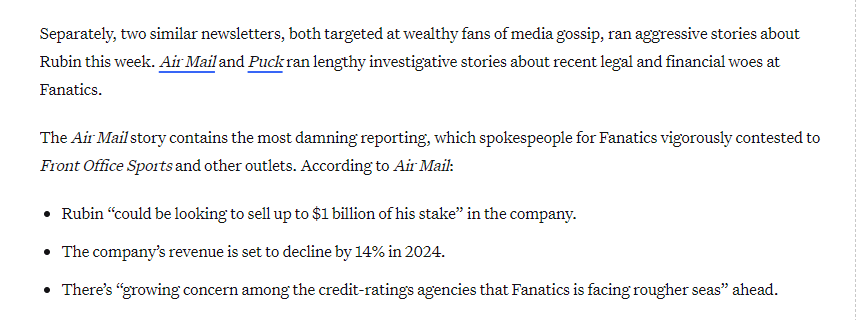M&A Season
Last week, there were M&A rumors (Penn and RSI). This week, there are M&A realities, with Apollo snagging Everi+IGT and Bally's accepting a Standard General offer.
The Bulletin Board
NEWS: Apollo adds to its gambling portfolio, nabbing IGT’s non-lottery business and Everi for $6.3 billion.
NEWS: Standard General finally made Bally’s an offer it can’t refuse.
LEGISLATIVE and REGULATORY UPDATES: Dallas committee will study resort casinos; Fines in Tennessee.
VIEWS: EKG points to a commonality causing many companies headaches in the US sports betting market.
AROUND the WATERCOOLER: Rumors point to trouble at Fanatics.
STRAY THOUGHTS: You can’t buy much for a dollar. Or can you?
SPONSOR’S MESSAGE - Sporttrade was borne out of the belief that the golden age of sports betting has yet to come. Combining proprietary technology, thoughtful design, and capital markets expertise, our platform endeavors to modernize sports betting for a more equitable, responsible, and accessible future.
Sporttrade’s newest feature, The Tape, prints all trades made on the app in real-time.
Apollo Gobbles Up More Gambling Companies
There is big news on the M&A front: Apollo Global Management is scooping up IGT’s Gaming & Digital business, which recently merged with Everi for $6.3 billion.
With the acquisition, Apollo is building quite the gambling portfolio, as it owns:
Venetian Resort in February 2022 ($2.25 billion)
Great Canadian Gaming in September 2021 ($3.3 billion)
A roughly 60% stake in Lottomatica, which Apollo wholly purchased from IGT in 2021. Apollo cut its stake earlier this year.
Bonus.com’s Alex Weldon neatly summed up the complexities of the deal in his writeup:
“The new deal will see Everi leave public markets entirely. Those holding $EVRI stock… will receive $14.25 per share in cash. With 84 million shares outstanding, that implies a market valuation of $1.2 billion for the business and a $2.2 billion enterprise value after accounting for its $1 billion in debt.
“Conversely, IGT is splitting its business into two parts. It will receive $4.05 billion in cash for its gaming division. IGT will use some of that money to pay off debts and distribute some to its shareholders.”
The new company will be controlled by a newly formed holding company owned by funds managed by affiliates of Apollo.
IGT can now focus on its core lottery product.
According to Earnings+More, “The remaining lottery business at IGT will change its name and ticker. Vince Sandusky will continue as CEO of that business, while IGT EVP of strategy and corporate development Fabio Celadon will head up IGT/Everi. “
E+M also cited several analysts, noting that Apollo had previously been sniffing around when IGT began its strategic review and that the spinoff of its non-lottery divisions combined with Everi sparked new interest.
The team at B Riley believes that more M&A activity is likely, as “intrinsic values are much greater than current public valuations.”
If at First You Don’t Succeed: Bally’s Says Yes to Standard General Offer
Standard General, the largest shareholder in Bally’s, finally got Bally’s to accept a takeover offer — SG owns 23% of Bally’s. According to Barry Jonas of Truist, the deal may not close until 2025.
Standard General is a hedge fund run by Chairman Soo Kim, who also happens to be the Chairman of Bally’s.
Bally’s shareholders will be happy, as the deal with Standard General is 18.25 per share, a 71 percent premium over the trading price, valuing the company at $4.6 billion. A previous offer of $15 per share was rejected, which seems wise considering the stock skyrocketed on the acquisition news last week, jumping nearly 25% to just under $17 per share after the news broke.
However, they should also be unhappy. Standard General made a far better offer in 2022 when it was willing to buy Bally’s at $38 per share, half its all-time high of $74 in March 2021.
For those interested in the financials of the deal, Earnings+More published a solid write-up this morning.
Unlike the original 2022 offer, Bally’s will not go private. Shareholders have two options:
Accept the $18.25 price.
Roll their shares over into the new company.
What will the new Bally’s look like?
“As part of the deal, Bally’s will merge with Queen Casino & Entertainment (QC&E), another operator owned by Standard General. The new company will remain publicly traded and will feature a combined portfolio of 19 casinos across 11 states.”
In addition to its regional properties and version 2.0 of its online business, Bally’s is also involved in two sizable projects:
It recently secured $940 million in funding from Gaming and Leisure Properties to complete the construction of its billion-dollar casino project in Chicago.
The implosion of the Tropicana in Las Vegas, which is expected to become the new home of MLB’s Oakland A’s following the team’s relocation — the land is currently owned by Gaming and Leisure Properties, but Bally’s controls the rights to develop the stadium project.
SPONSOR’S MESSAGE - Highest approvals. Zero chargebacks. No trade-offs.
Aeropay’s bank transfers deliver industry-leading net profits without compromising security or conversion rates. 95% of Aeropay transactions are approved, allowing more players and higher customer satisfaction rates.
Aeropay reduced fraudulent transactions during the NFL season by nearly 400%.
With its bank-driven approach to secure and efficient money movement, Aeropay is the smart choice for businesses.
Ready to elevate your payment experience? Check out Aeropay. Book a Demo
Legislative and Regulatory Updates: Dallas Committee to Study Resort Casinos; Fines in Tennessee
Dallas business leaders will explore legalizing casinos: Dallas business and community leaders have announced the North Texas Commission committee, which will explore resort casinos and other expanded gambling options. According to the Dallas Business Journal, the “exploratory committee” is expected to launch in the fall and is tasked with studying “The implications of destination gaming and make recommendations regarding issues like economic development, workforce demands, infrastructure requirements, transportation, and public safety impacts.”
Tennessee hits three sportsbooks with fines: The Tennessee Sports Wagering Council (SWC) fined three Tennessee sportsbooks: BetMGM, Action 24/7, and ESPN Bet. Per the SWC, Bet MGM allowed customers to create SGPs that included penalty cards given out during soccer games, which is against Tennessee regulations. Action 24/7 and ESPN Bet were fined for self-exclusion violations.
Product Is the Difference Between Success and Failure
What third-tier sports betting operators can break through? Eilers & Krejcik Gaming (a newsletter sponsor) attempted to answer that question in its latest Sports Betting Market monitor.
According to EKG (a newsletter sponsor), attrition will accelerate further over the next 24 months.
The difference between success and failure is simple, with EKG pointing to a commonality among the third-tier sportsbooks in its proprietary app testing: middling to poor product.
EKG believes a very limited number of operators from the group with less than 1% market share can break through.
The rest are likely on borrowed time.
One operator specifically mentioned was Betfred. Despite a stated commitment to the US, EKG believes Betfred is not long for the US market, having already exited two key markets, Maryland and Ohio.
Additionally, Betfred has $59 million in write-offs and drawdowns in 2023.
And what did it get for that? $6.8mm in GGR.
SPONSOR’S MESSAGE - Kero is a premier micro-betting provider, powering more than 150 operators across the globe.
Our extensive coverage of fast markets in Football, Basketball, Baseball, and Soccer is a proven method for increasing in-play handle and hold.
Talk to us about how we utilize algorithmic recommendation to power highly contextual micro markets for the ultimate in-play experience.
Around the Watercooler
Social media conversations, rumors, and gossip.
All is not well on the Fanatics front, according to Front Office Sports. After summarizing the ongoing legal battle with DraftKings over a VIP executive, FOS pointed to two investigative reports:
A Fanatics representative flat-out denied that Rubin was looking to sell off $1 billion of his stake in the company and that revenue would be down in 2024. The Fanatics rep countered by saying revenue is up 17%.
Fanatics was supposed to shake up the US sports betting landscape, but outside of its tiff with DraftKings and briefly displacing DraftKings as the #2 operator in New Jersey (thanks to “borrowing” one of the biggest sports bettors in the country for a few months), Fanatics Sportsbook has been more fizzle than sizzle.
Fanatics falls into the “others” category, placing it no better than seventh in national market share. According to Eilers & Krejcik Gaming (have I mentioned it is a newsletter sponsor?), BetRivers ranks sixth at 1.6% market share, and the rankings don’t include Hard Rock, which has leapfrogged its way into the Top 5 thanks to its Florida monopoly.
So, yes, revenue might be up 17%, but expenses could be up even more—Fanatics is a privately owned company, so we will never know.
Stray Thoughts
You can’t buy much for a dollar unless you’re in the market for a sports media company.
Per the most recent EKG Line newsletter:
“DraftKings confirmed the sale of its VSIN betting content network back to Musberger Media this week, saying it was “optimizing” its media investments to focus on “the most critical areas” of its business. DK did not reveal the price of the sale but channel checks suggested it as likely as low as $1.”
The price is extremely interesting, as it’s the same price Dave Portnoy paid Penn to buy back Barstool Sports. Think about that for a moment: These companies want out so badly that they are willing to undercut Dollar Trees’ prices (which are now $1.25).
One can only imagine how much money these media companies cost them beyond the sizeable purchase price.







